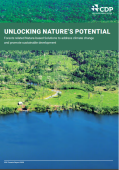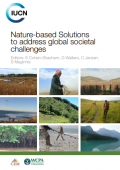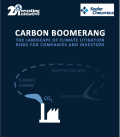
This policy brief looks at the actions taken by companies on Nature-based Solutions (NbS). It describes the increasing importance of NbS in the main international regimes related to climate and biodiversity, presents cases of NbS being implemented and supported by companies, and provides a set of recommendations for policymakers to strengthen the private sector’s engagement with NbS.

This report proposes a framework for Nature-based Solutions (NbS), including a set of general principles for any intervention and ten case studies of NbS applications from around the world.

Climate-related litigation risk is the long-term risk that lawsuits targeting companies with high cumulated past emissions create liabilities, based on the company’s share of responsibility in the cost of global warming. It is not limited to direct emissions and likely to occur in countries where extra-territorial jurisdiction and class action lawsuits exist. The tort cost could include adaptation costs at the local level for states and cities (invested by anticipation), thus shortening the time horizon of risk from the years 2050-2100 to today. This concept note focuses on this type of risk.
This report outlines ATLAS’ five years’ progress on helping the Agency integrate climate adaptation across its portfolio, building the climate resilience of national partners, and strengthening methodologies to assess and respond to climate impacts in sectors as diverse as health, urban planning, transport and water management.
The Guidebook provides an overview of the process needed for designing and implementing effective monitoring and evaluation (M&E) for Ecosystem-based Adaptation (EbA). It breaks this process down into four key steps that will help you develop and operationalise an M&E system for EbA, as well as effectively use and communicate M&E results.
